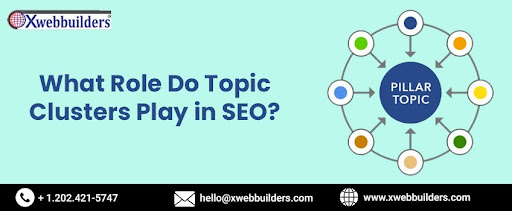
September 01, 2025

In the world of SEO (Search Engine Optimization), topic clusters have emerged as a strategic approach to improve website visibility and search rankings. Topic clusters organize content around a central pillar topic and related subtopics, creating a connected network of information. This approach helps search engines understand the context and relevance of the content, resulting in higher rankings for the entire cluster. Topic clusters also enhance user experience by providing comprehensive and cohesive information on a particular subject. By leveraging topic clusters, businesses can effectively target long-tail keywords, increase organic traffic, and establish themselves as authoritative sources of information. In this way, topic clusters have become a valuable tool in optimizing content for search engines and driving organic growth and our best SEO company in Ashburn VA is going to tell you how.
Topic clusters are a content organization strategy used in SEO to improve website visibility and search rankings. They involve creating a central pillar page that covers a broad topic and linking it to multiple related subtopic pages. This approach helps search engines understand the relevance and interconnectedness of the content. Topic clusters enhance user experience by providing comprehensive information on specific subjects. They also allow businesses to target long-tail keywords and increase organic traffic. By implementing topic clusters, businesses can optimize their content strategy and improve their overall SEO performance.
Topic clusters and SEO have a strong relationship as topic clusters have become an effective strategy for optimizing content and improving search engine rankings. Here is a closer look at the relationship between topic clusters and SEO:
- Improved Relevance and Context: Topic clusters help search engines understand the relevance and context of the content on a website. By organizing content around a central pillar page and linking it to related subtopic pages, topic clusters create a network of interconnected information. This structure allows search engines to establish the relationships between different pieces of content, making it easier for them to determine the relevance of the website to user queries.
- Targeting Long-Tail Keywords: Topic clusters provide an opportunity to target long-tail keywords, which are more specific and have lower competition compared to broad keywords. Each subtopic page within a cluster can target a specific long-tail keyword related to the overarching pillar topic. By creating high-quality content that addresses these long-tail keywords, businesses can attract targeted organic traffic and improve their visibility for niche search queries.
- Enhanced User Experience: Topic clusters improve user experience by providing comprehensive and cohesive information on a particular subject. When users land on a pillar page, they can navigate through the subtopic pages to explore more specific aspects of the topic. This creates a seamless and intuitive user experience, allowing visitors to access the information they need quickly and easily. Positive user experience signals, such as longer dwell time and lower bounce rates, can indirectly impact search engine rankings.
- Authority and Expertise: Topic clusters allow businesses to establish themselves as authoritative sources of information in their industry. By creating in-depth, comprehensive content on a specific topic, businesses demonstrate their expertise and knowledge. This can help build trust and credibility among users and search engines, leading to higher rankings. Additionally, as the cluster grows with more high-quality content, it signals to search engines that the website is a valuable resource, further boosting its authority.
- Internal Linking and Indexation: Topic clusters rely on internal linking, where the pillar page links to the subtopic pages and vice versa. This internal linking structure helps search engine crawlers discover and index the content more efficiently. It also distributes the authority and relevance of the pillar page across the subtopic pages, improving their chances of ranking higher in search results. Effective internal linking within topic clusters ensures that all relevant content is indexed and contributes to the overall SEO performance of the website.
- SEO Scalability and Adaptability: Topic clusters offer scalability and adaptability in SEO strategies. As businesses create more content and expand their expertise, they can add new subtopic pages to their existing clusters or create new clusters around different pillar topics. This allows businesses to adapt to changing user needs and industry trends while maintaining a well-structured and organized content ecosystem that search engines can understand and rank.
Topic clusters play a crucial role in SEO by organizing and optimizing content to improve search engine rankings. Here are some key roles that topic clusters fulfill in SEO by our SEO agency:
- Content Organization: Topic clusters provide a systematic approach to organizing content on a website. The central pillar page acts as a hub that covers a broad topic, while the related subtopic pages dive deeper into specific aspects. This structure helps search engines understand the relevance and context of the content, making it easier for them to index and rank the website.
- Keyword Targeting: Each subtopic page within a topic cluster focuses on targeting specific long-tail keywords related to the overarching pillar topic. Long-tail keywords are more specific and have lower competition, allowing businesses to capture targeted organic traffic. By optimizing each subtopic page for relevant keywords, businesses increase their visibility for a wide range of search queries.
- Internal Linking: Topic clusters rely on internal linking, where the pillar page links to the subtopic pages and vice versa. This internal linking structure establishes a strong connection between the pages within the cluster. It helps search engines discover and navigate through the content more effectively, improving the indexation of the website. Internal linking also distributes the authority and relevance of the pillar page across the subtopic pages, boosting their chances of ranking higher in search results.
- Authority Building: Topic clusters contribute to building authority and expertise in a particular subject. By creating comprehensive and in-depth content on the pillar topic and its related subtopics, businesses demonstrate their knowledge and authority in the industry. Search engines recognize the value of such content and are more likely to reward the website with higher rankings. As the cluster grows with more high-quality content, it reinforces the website's authority and positions it as a reliable source of information.
- User Experience: Topic clusters enhance the user experience by providing a logical and organized structure for accessing information. Users can navigate through the pillar page and subtopic pages to explore specific aspects of the topic. This cohesive structure ensures that users can find the information they are looking for easily, leading to a positive user experience. Improved user experience, such as longer dwell time and lower bounce rates, can indirectly influence search engine rankings.
- Comprehensive Coverage: By utilizing topic clusters, businesses can cover a wide range of aspects related to a specific topic. This comprehensive coverage makes the website more valuable to users, as they can find all the relevant information they need in one place. Search engines recognize the value of comprehensive content and are more likely to rank the website higher as a result.
In conclusion, topic clusters play a critical role in SEO services by enhancing content organization, improving keyword targeting, facilitating internal linking, building authority, enhancing user experience, and providing comprehensive coverage. By structuring content around a central pillar page and related subtopic pages, businesses can optimize their website for search engines, improve rankings, and attract targeted organic traffic. Topic clusters create a logical and interconnected network of information, making it easier for search engines to understand the relevance and context of the content. By leveraging topic clusters effectively, businesses can establish themselves as authoritative sources in their industry and drive organic growth through improved search engine visibility. For more information or to avail our SEO services in Ashburn USA, visit Xwebbuilders.com .